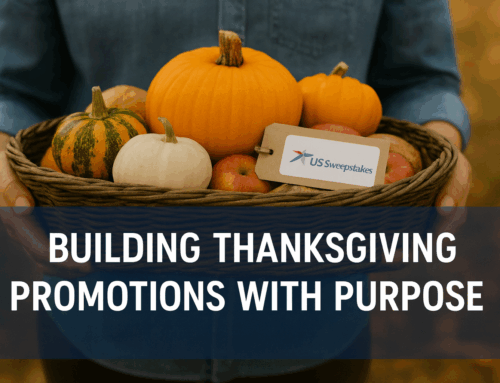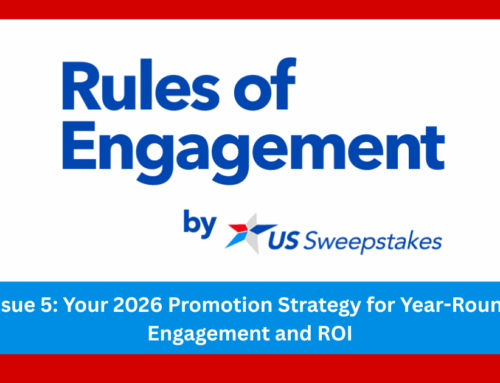 Although you may or may not be familiar with the general premise of a sweepstakes, it’s important to always be conscious of the specific laws that apply to your state. Often, businesses will be in violation of sweepstakes laws without even realizing it.
Although you may or may not be familiar with the general premise of a sweepstakes, it’s important to always be conscious of the specific laws that apply to your state. Often, businesses will be in violation of sweepstakes laws without even realizing it.
In this article, we’ll dive into Sweepstakes Laws in the Northern U.S. States which, for this article, includes Alaska, Connecticut, Delaware, Idaho, Illinois, Indiana, Iowa, Kansas, Maine, Maryland, Massachusetts, Michigan, Minnesota, Missouri, Montana, Nebraska, New Hampshire, New Jersey, New York, North Dakota, Ohio, Oregon, Pennsylvania, Rhode Island, South Dakota, Vermont, Washington, Wisconsin and Wyoming. NOTE: This list is NOT inclusive of all the rules, regulations, and laws regarding sweepstakes. Always consult your sweepstakes administrator.
First, let’s define what constitutes a sweepstakes.
WHAT IS A SWEEPSTAKES?
A sweepstakes, unlike a contest, is a game of chance that requires no skill. Winners are randomly selected.
Unlike a lottery, sweepstakes can be run by individual corporations and are not required to be federally or state sanctioned. Also dissimilar to lotteries, sweepstakes require no purchase to enter. In fact, it is illegal to require purchase to enter. One exemption to this rule is if there is a free Alternative Means of Entry (AMOE) in addition to a purchase entry option. An example of this would be if a fast food chain gave away game pieces with purchase of a meal, they would also allow for a free mail-in option to participate.
Common examples of sweepstakes include online giveaways or drawings, in-store giveaways, and instant-win sweepstakes.
WHAT ARE THE GENERAL RULES FOR SWEEPSTAKES IN THE U.S.
- Sweepstakes must not require ‘consideration’, which is defined as an entrant giving something of value in order to participate. Although this can be monetary, it is not only monetary and may include filling out a survey or listening to a sales presentation. Contact your sweepstakes administrator to see if your sweepstakes includes consideration.
- You can have consideration if, and only if, you also provide an Alternative Means of Entry (AMOE). AMOEs can include entry via a free method such as an online entry form or mail-in form. The AMOE must not require the participant to give anything of value (either monetary or non-monetary) and must be expressly stated in the rules and regulations.
- If your sweepstakes includes consideration, participants who entered via consideration cannot have a greater likelihood of winning than participants who entered via free AMOE.
- Sweepstakes sponsors must not coerce entrants into believing they must pay in order to participate.
- Prize recipients should not be required to pay any fee to receive their prizes.
- Rules must always be clear and accessible throughout the sweepstakes. There should be no modification of rules during or after the sweepstakes. The rules should specify opening and closing dates, who is eligible to participate, odds of winning, prizes available, how winners will be selected, and other important details. Contact your sweepstakes administrator to find out what disclosures should be included in your sweepstakes.
- Sweepstakes should take into consideration the age and residency of their participants. If any entrant cannot easily or legally claim a prize (i.e. someone who is under the age of 18 who is given a night at a resort and is not legally allowed to check in by themselves), then there could be potential legal ramifications.
- Sweepstakes must be transparent about any use of a customer’s private data such as name or photo.
- If a prize is valued greater than $600, sweepstakes sponsors will need to issue an IRS 1099-Misc.
- If your corporation sources a prize from an outside supplier that fails to provide your corporation with that prize, you are still legally bound to give that prize to the winner.
Although these are the general promotion laws, there are nuances within these rules and it is always recommended that you consult with a sweepstakes management company before running your promotion.
Now that you have an overview of the current general promotion laws, let’s dive into the specific conditions for your Northern U.S. state.
SWEEPSTAKES LAWS IN NORTHERN US STATES
Here is a list of Northern U.S. States that do not currently have any special exemptions or conditions beyond the standard general promotion law for sweepstakes (this excludes contests or lotteries):
- Alaska
- Connecticut
- Delaware
- Idaho
- Illinois
- Iowa
- Kansas
- Maryland
- Minnesota
- Missouri
- Montana
- Nebraska
- New Hampshire
- New Jersey
- North Dakota
- Oregon
- Pennsylvania
- South Dakota
- Washington
- Wisconsin
- Wyoming
If you are running a sweepstakes specific to one of those states, you should be in the clear if you follow the general promotion laws. However, you should still work with a sweepstakes management company that is aware of the legal intricacies to ensure your sweepstakes is legally compliant.
Here is a list of addendums to general promotion law for sweepstakes.
For each addendum, we’ll list the Northern U.S. State that is adherent to that addendum.
ADDENDUM: Sweepstakes that feature an alcohol brand must be pre-approved by a state alcohol control board. State requirements may also vary depending on whether the brand is for beer, wine or spirits. NOTE: Some brands may also notify additional states based on past infractions or previous experience. This is not a full list of states that require pre-approval for sweepstakes that feature an alcohol-brand. This list only includes Northern U.S. States (as defined above).
- Indiana
- Maine
- Maryland
- Minnesota
- Vermont
ADDENDUM: Sweepstakes cannot be related to tobacco. This list only includes Northern U.S. States (as defined above).
- Massachusetts
- Michigan
ADDENDUM: Sweepstakes cannot require entrants to visit a store as this may be viewed as ‘consideration’.
- Ohio
ADDENDUM: Sweepstakes in which the total prize or prizes are valued over $5,000 must be registered and bonded. This is not a full list of states that require registration and surety bonds. This list only includes Northern U.S. States (as defined above).
- New York
ADDENDUM: Sweepstakes in which the total prize or prizes are valued over $500 and are advertised in a retail environment must be registered, but do not need to be bonded.
- Rhode Island
We hope this article helps to clarify sweepstakes laws and regulations for your Northern U.S. state. If you are considering running a sweepstakes, remember that the rules and regulations are more complex than we’ve explored within this article and it is always a smart idea to consult a sweepstakes organization to make sure you are conducting a legal, safe, and fun sweepstakes!
Right now, at US Sweepstakes, we’re offering a free 30 minute consultation to see if a sweepstakes is the right move for your organization. If interested, simply fill out this form and we’ll get back to you ASAP.
Tune in later when we’ll explore sweepstakes laws and regulations in Southern U.S. States.



